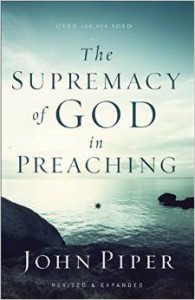
It is one of those elements in preaching that is seems to come solely through experience. It is better caught than taught. It has enormous potential to help or harm a sermon. What is it?
Tone.
Diagnosing A Nag
When I first began to preach I did so like many young preachers—zealously, but somewhat recklessly. I ascended to the sacred desk every six to eight weeks without many proper foundations in place. In fact, I was solidifying sermonic convictions on the spot. “Oh yeah,” I thought after one week, “Paul definitely has it right when he told the Colossians, ‘Pray that I may make it clear, which is how I ought to speak.'” Later I befriended “main point preaching” and that always necessary tool named “Order.” Discriminatory application was light-going-off-in-your-head discovery which came about three years into somewhat regular preaching as an associate pastor. As these convictions fell into place I still had a nagging feeling as though I was missing out on something essential; a key convictional cog yet to be discovered.
Eventually I planted a church and started preaching every week. The unaddressed nag soon became a growing weight.
Something was missing and I couldn’t put my finger on it. Year One went into the books, Year Two said, “Adios,” and I’d yet to get my homiletical hands around diagnosing the nag that was becoming a drag.
Believe it or not, the diagnosis only came about five weeks ago: I had no articulated understanding of the tone I longed to have in preaching.
Maybe a helpful way to communicate the problem is to make it analogous to a problem I often have in sermon prep. It usually doesn’t take me long to get a proper sense of a passage’s meaning and message, but it can take me a while to adequately summarize it into a sentence. Until I get that sentence down I feel somewhat aimless. The same thing was happening with tone in preaching. I knew faithful preaching meant declaring God’s word with a variety of characteristics such as boldness (Eph. 6:20) and clarity (Col. 4:4). I just wasn’t able to get all those characteristics summarized into a cohesive definition of what tone ought to permeate faithful preaching.
So I hit the books to see what they’d say.
What the Masters Say
One afternoon I grabbed a handful of books on preaching from the study to analyze what they teach about tone. Not surprisingly, there is quite a bit of uniformity on the matter.
In Evangelical Eloquence R.L. Dabney says a good sermon as “evangelical tone. This is a gracious character, appropriate to the proclamation of that gospel where ‘mercy and truth meet together, and righteousness and peace kiss each other’ . . . to deliver evangelical matter in any other tone is inappropriate to the preacher’s attitude, as a ransomed sinner honored to become the herald of the law and of mercy to the lost.”
Spurgeon speaks about tone in a variety of ways, but it’s safe to say The Prince believes earnestness is it’s proper quality. In his lecture, “Earnestness: Its Marring and Maintenance,” Spurgeon writes, “If I were asked—What in a Christian minister is the most essential quality for securing success in [preaching]? I should reply, ‘earnestness’: and if I were asked a second or a third time, the conclusion that, as a rule, real success is proportionate to the preacher’s earnestness.”
John Stott, in Between Two Worlds, gives a somewhat sustained discourse on tone in the book’s last two chapters. It’s hard to summarize in a sentence, but you can hang his argument on these four pillars: sincerity, earnestness, courage, and humility.
In The Supremacy of God in Preaching John Piper commends Thomas Chalmers’ example of “blood-earnestness” and Spurgeon’s reverent solemnity. Piper’s personal thesis on tone is this: “Gravity and gladness should be woven together in the life and preaching of a pastor in such a way as to sober the careless soul and sweeten the burdens of the saints.”
Complete with anatomical figures for resonation and articulation, Haddon Robinson’s classic Biblical Preaching argues for a homiletical tone marked by diversity. He says, “Monopitch drones us to sleep or wears upon us like a child pounding on the same not on the piano.”
Bryan Chapell’s textbook Christ-Centered Preaching contains a useful discussion on “the attitudes”—or tones—of proper exposition. After taking into account all preaching terms found in sacred Scripture Chapell says, “Just as no one word captures all the dimensions of biblical preaching, so no one [tone] can reflect its many facets.” If there is a universal foundation for all preaching Chapell would settle on “a humble boldness.” He concludes, “Our tone should always resonate with the humility of one who speaks with authority under the authority of another.”
Tony Merida’s Faithful Preaching would agree with the aforementioned marks of boldness, sincerity, and humility. He adds a unique wrinkle when he encourages, “Speak with conversational tone like you would normally speak to another person . . . a conversational tone does not mean that you speak without pathos, of course. Even in a one-on-one conversation you still speak with emphasis, passion, and variety.”
In Preach Mark Dever and Greg Gilbert give five aspects of tone “we should desire in our sermons.” It must be: biblical, humble, clear, sober and serious, and “suffused with a joyful confidence.”
Finally, you have to love Jason Meyer’s lucid language on tone in his Preaching: A Biblical Theology. He writes, “[My] emphasis on heralding is on tone of the delivery. Preaching is not discussing or explaining something with the tone and tenor of a fireside chat. The ‘herald’ is the town crier that speaks with the forceful tone of ‘hear ye, hear ye.’ In other words, the herald made his proclamation with a rousing ‘attention-getting noise’ that could not be ignored.”
Bringing it All Together
I’d read many of those books years ago, but something finally clicked when I read the relevant sections in one sitting. Here now is how I’d articulate the tonal aim in preaching.
The Vertical Dimension: “Reverent Affection”
We must recognizethat we preach as God’s mouthpieces in God’s pulpit. We must therefore think, first and foremost, about the tonal quality required in our preaching before God.
For me, the phrase “reverent affection” best captures the fullness of a faithful preacher’s disposition before God. The Lord dwells in unapproachable light and blinding holiness, so levity and triviality must be banished when standing behind the sacred desk. To be entrusted with His infallible, inspired, living, active, powerful, and eternal word demands that our preaching must be done in a vibrant fear of God. We must preach with the full weight of reverence.
But we’d miss out on something if we stopped there. Yes, God dwells in unapproachable light, but through faith in Christ we can come to His shining throne with confidence! He calls us His children and sings over us with great delight. Our reverence must thus be married to a compelling, childlike love for the Father. This means amazement at God’s glory, delight in His mercy, and praise for His provision in Christ will be hallmarks in each sermon.
Our sermons need the winsome weight of “reverent affection.”
The Horizontal Dimension: “Urgent Love”
A preacher is a steward of God and shepherd of men. God intends our preaching to be ordinary way in which He saves sinners and sanctifies saints. What then should be the spiritual sense—the tone—in which we want to preach toward men? I believe it’s best summarize as “urgent love.”
We are in the wrong business if Spirit-wrought, heart-rending urgency isn’t consistently bubbling up in our exposition. Souls hang in the balance every time God’s word is preached. Aromas of life and death rise, and our Cornerstone will either comfort or crush. Faithful preachers want everyone who hears the sermon to experience Jesus’ living comfort. All of these realities mean urgency must come through each week. Let there be something of the Baptist in all our preaching, “Behold the Lamb of God who takes away the sin of the world!”
Urgency can be a harsh sword if it isn’t also married with love. Faithful shepherds love the sheep and can’t help but saturate their sermons with expressions of tender care and warmth. To adapt the great apostle’s instruction in Colossians 3, we might say, “In all the sermonic elements put on love, which binds them together in perfect harmony.”
Spiritual Kindling
All his life Robert Murray M’Cheyne felt a yearning towards foreign missions. He loved to hear about God’s work among the nations. When his friend Alexander Duff returned from missionary work and spoke about God’s work in India M’Cheyne was in the audience and said, “[Duff] spoke with greater warmth and energy than ever. He kindles as he goes.”
That last little statement is why we should think hard about tone in preaching. Tone has spiritual power to kindle a flame for God as it goes. What kind of flame is your tone kindling? I hope my preaching is one that fans a consuming fire of reverent affection before God and urgent love towards men.




